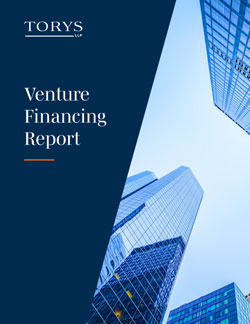Venture Financing Report
Authors
 Konata T. Lake
Konata T. Lake
Marko Trivun

Josh Teichman
The dealmaking practices of over 200 Canadian venture capital financings, and how they align with U.S. deal terms, were analysed in our inaugural industry study.
Get our deep dive on the most common deal terms in the Canadian startup ecosystem, how the pandemic affected financing negotiations, and what’s next for the industry in the latest commentary from Torys’ Emerging Companies and Venture Capital team.
Download our Venture Financing Report
Executive Summary
The events of 2020 resulted in a series of knock-on effects for businesses and investors in Canada, and the venture capital and startup ecosystems were no exception. Unsurprisingly, investors gained a higher degree of leverage amid the uncertainty brought upon by the global pandemic. The implications of this included a short-term increase in investor-friendly terms during Q2 and Q3. Specifically, throughout Q2 and Q3, we saw a higher concentration of senior liquidation preferences, participation rights and cumulative dividends.
The pandemic aside, the results of our inaugural study show that companies and startups appear to be looking to best practices to inform their dealmaking processes: the preferred share terms negotiated by Canadian companies in 2020 were by and large consistent with the terms outlined in the model legal documents prepared by the Canadian Venture Capital and Private Equity Association, although there was less consistency in the form of documentation used.
The results are also consistent with trends outlined in Torys’ PE Pulse 2021 sentiment survey of Canadian institutional investors, including a focus among investors on opportunities coming out of the technology sector, which was an attractive source for deals well before the pandemic. As remote business became the norm, many companies have looked to transform and advance their digital strategies, including through online commerce enhancements, video and electronic communications, and other sector-specific technological growth. These trends are working together to create a positive outlook for the technology startup ecosystem in Canada.
Longer term, we are still seeing the ongoing alignment among Canadian and U.S. deal terms as Canadian startups mature and attract more inbound foreign investment. In the current study, the key term where the Canadian financings deviated from comparable U.S. studies was the slightly higher prevalence of Canadian companies issuing preferred shares with redemption rights. As the U.S. remains the largest inbound source of foreign investment in Canada, trends in Silicon Valley continue to have a significant ripple effect on Canadian dealmaking. We expect this trend to continue with the increasing participation of U.S. investors in Canadian financing rounds.
To discuss these issues, please contact the author(s).
This publication is a general discussion of certain legal and related developments and should not be relied upon as legal advice. If you require legal advice, we would be pleased to discuss the issues in this publication with you, in the context of your particular circumstances.
For permission to republish this or any other publication, contact Janelle Weed.
© 2025 by Torys LLP.
All rights reserved.
